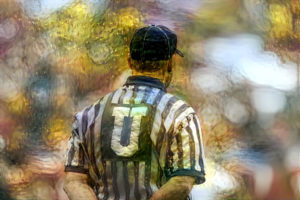When I was young I saw rules as a limitation of freedom (which they are) and resented them.
Over time, I grew to recognize that rules are essential. As much as a child may think they want to live in a world without rules, the first time they play a game, they have chosen to give up the freedom to do anything, in favor of a set of rules. They willingly do this because the rules of the game are an improvement over chaos. Kids running around screaming quickly becomes boring or scary.
Basketball is a word that refers to a set of rules that includes a description of the ball, court, basket, number of players, objective, scoring etc. Change the rules and it is no longer the same game. The Game is the Rules.
I am not advocating a blind adherence to rules as a substitute for critical thought. Some rules are stupid, outdated, or even evil. However, when you find a set of rules that work well, within the context of the game you are playing, it makes sense to hold tight to those rules. The better the rules work, the more we should strive to protect them.
The game of Go (sometimes called Wei Chi) is perhaps, the closest we have come to inventing a perfect game. The rules of Go have not changed in over 2,500 years.
When people love winning more than the game itself, they are tempted to interpret or even change the rules to their immediate advantage, but in doing so, they risk destroying the game itself. A wise person values the game above the momentary thrill of winning in the present moment, and thus interprets or even changes rules for the benefit of the future of the game, ignoring the immediate consequences.
 In sports we often have referees, whose role is to remain neutral, and apply or even interpret the rules fairly, and in a manner calculated to best serve the ‘game’, without regard to which team might gain advantage in the present, so that future generations may benefit from those same rules.
In sports we often have referees, whose role is to remain neutral, and apply or even interpret the rules fairly, and in a manner calculated to best serve the ‘game’, without regard to which team might gain advantage in the present, so that future generations may benefit from those same rules.
Rules are essential to civilization, whether it is tribal law, grammatical rules of language, traffic laws, or the charter of the United Nations. Rather than referee’s we look to Judges to serve a similar role. Judges should remain impartial and refrain from interpreting the law to favor one plaintiff or position over another. The precedents that they set should serve to improve the quality of the law, and preserve that law for future generations.
It is hard enough, when playing a game, to be willing to lose the game in favor of following the rules. But when it comes to our own lives, this is considerably more challenging.
The first step is to choose a set of rules for living your life, that make sense to you. In the absence of such rules, life devolves into chaos. The first limb of Yoga is called the Yamas – five rules for living a sane life: Do no harm; do not lie; do not steal; do not hoard (or covet); and practice sexual restraint. These principles should sound familiar to you. Variations of these rules can be found in almost every society on every continent and island of the world. These rules are far older than the game of go.
 The second part is harder. We must attempt to abide by these rules, not only when it is easy, but more importantly, when it is hard – otherwise the rules mean nothing. We must place our allegiance to the rules, above our own success. This applies not just to our own lives, but to society. Lately it seems that almost all of our politicians are more concerned with winning, for themselves and their party, then they are with the fate of the nation. Each time a politician chooses or reverses a position based not upon what is good for the country but what is good for their own career, we move one step closer to the abyss.
The second part is harder. We must attempt to abide by these rules, not only when it is easy, but more importantly, when it is hard – otherwise the rules mean nothing. We must place our allegiance to the rules, above our own success. This applies not just to our own lives, but to society. Lately it seems that almost all of our politicians are more concerned with winning, for themselves and their party, then they are with the fate of the nation. Each time a politician chooses or reverses a position based not upon what is good for the country but what is good for their own career, we move one step closer to the abyss.
Ultimately, these rules are worth holding onto because they work, and have worked for thousands of years, and because the alternative to these rules is unthinkable in the modern age of technology and unbridled power.
2 Comments
-
Great insights. I myself struggle with rules when they are made up from a persons ego with no common sense to why they are made.
To give you an example; I went to a Yoga training that turned me into a puppet
“you must do this like this and say this like this specifically”. There was a lot of repeat after me, and I lost myself which is why I was going to the Yoga training in the first place… to find myself as a teacher and reinforce any knowledge that would help me grow. It did not resonate with me at all.
I followed the rules out of respect and when it was all over ran out of the training and felt very drained and confused.
I practice Yoga with my own rules now that resonate with me and help me to ground myself, love myself, and ultimately help others-
Author
Carol, I am so sorry to hear that your recent teacher training experience was a positive experience. As you know, I am not a big fan of a rigid, one-size-fits-all approach to teaching. If you have a moment, let me know via email which teacher training program you attended. I often have students ask for recommendations, and I want to make sure I do not suggest this program to others.
-






